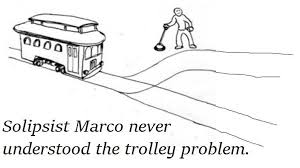The creator of DST gets the first slap. Then the timezones asshole.
I’m planning to do a presentation at work on how to deal with dates/times/timezones/conversion/etc in the next few weeks some time. I figure it would be a good topic to cover. I’m going to start my talk by saying “first, imagine there is no such thing as timezones or DST.” And then build on that.
DST people should get hung. By three balls. Fuck them.
Is this something that is going to be publicly available? If so, post a link when you have it.
Sandford Fleming (the guy who invented time zones) actually made it easier.
Before timezones, every town had their own clock that defined the time for their town and was loosely set such that “noon is when the sun is at its highest point in the sky.” Which couldn’t be measured all that accurately.
If it wasn’t for Fleming, we’d be dealing with every city or town having a separate time zone.
Everyone complaining about timezones is truly missing the forests for the trees.
Save a slap for the dude who invented sundials, and another slap for the dude who invented civilization.
Save a slap for the dude who invented slaps!
Some asshole had the idea to water a seed and now I have to pay taxes. Fuck that guy.
Is he cute?
Not any more. But some of the IRS guys are smokin’ hot, I’m sure, if that’s what you’re into.
This but unironically.
Imagine, if we were just all on the same time. It’d just make things, a little easier.

Life, that is. It would just make life a little easier.
All in the same time? But… Then the sun might go down at noon. That doesn’t make sense…
Wait… Noon? Noooon…
The word noon comes from a Latin root, nona hora, or “ninth hour.” In medieval times, noon fell at three PM, nine hours after a monk’s traditional rising hour of six o’clock in the morning. Over time, as noon came to be synonymous in English with midday, its timing changed to twelve PM.
Oh now that’s worse
We must establish a new order of monks, who all get up at 6am UTC. We can call them in sync
Just let go of all meaning. 2 PM can be in the middle of the night if you just let go.
You might want to show them this video https://youtu.be/-5wpm-gesOY
What’s DST?
Edit: oh it means Daylights Savings Time
Dick sucking time
That’s the only time zone I’m for!
Oh yeah, please do imagine there is no such thing as a time zone.
On an ellipsoid!
No, see, how it would work without timezones is:
- Everyone would use UTC and a 24-hour clock rather than AM/PM.
- If that means you eat breakfast at 1400 hours and go to bed around 400 hours and that the sun is directly overhead at 1700 hours (or something more random like 1737), fine. (Better than fine, actually!)
- Every area keeps track of what time of day daily events (like meals, when school starts or lets out, etc) happen. Though I think generally rounding to the nearest whole hour or, maybe in some cases, half hour makes the most sense. (And it’s not even like everyone in the same area keeps the same schedule as it is now.)
- You still call the period before when the sun is directly overhead “morning” and the period after “afternoon” and similarly with “evening”, “night”, “dawn”, “noon”, “midnight” etc.
- One caveat is that with this approach, the day-of-the-month change (when we switch from the 29th of the month to the 30th, for instance) happens at different times of the day (like, in the above example it would be close to 1900 hours) for different people. Oh well. People will get used to it. But I think it still makes the most sense to decide that the days of the week (“Monday”, “Tuesday”, etc) last from whatever time “midnight” is locally to the following midnight, again probably rounding to the nearest whole hour. (Now, you might be thinking "yeah, but that’s just timezones again. But consider those timezones. The way you’d figure out what day of the week it was would involve taking the longitude and rounding. Much simpler than having to keep a whole-ass database of all the data about all the different timezones. And it would only come into play when having to decide when the day of the week changes over.)
- Though, one more caveat. If you do that, then there has to be a longitudinal line where it’s always a different day of the week on one side than it is just on the other side. But that’s already the case today, so not really a drawback relative to what we have today.
regarding day change, you could also just have it change at UTC midnight and the entire planet bongs at that time if they’re awake.
Bank holidays would be really awkward. You start wort at 23 and the next day is off so you would just have to work that one hour.
Office workers could probably move hours around. It would get complicated for shift workers though. Paying overtime for work on holidays?
My experience is that you start work and the next day is off so you just lock the doors and keep working, but maybe there are financial institutions without backlogs idunno.
Yeah. I figured the day-of-the-month change should definitely happen at UTC midnight. I kindof like the idea that a day of the week lasts from before I wake up to after I go to sleep. (Or at least that there’s no changeover during business hours.)
But hell. If you wanted to run for president of the world on a platform of reforming date/time tracking but planned for the days of the week to change at midnight UTC, I’d still vote for you.
You still call the period before when the sun is directly overhead “morning” and the period after “afternoon” and similarly with “evening”, “night”, “dawn”, “noon”, “midnight” etc.
Note that the Sun position is not consistent throught the year and varies widely based on your latitude.
In Iceland (and also Alaska) you can have the Sun for a full 24 hours in the sky (they call it “midnight sun”) during Summer solstice (with extremelly short nights the whole summer) and the opposite happens in Winter, with long periods of night time.
I think it still makes the most sense to decide that the days of the week (“Monday”, “Tuesday”, etc) last from whatever time “midnight” is locally to the following midnight, again probably rounding to the nearest whole hour.
Just the days of the week? you mean that 2024-06-30 23:59 and 2024-07-01 00:01 can both be the same weekday and at the same time be different days? Would the definition of “day” be different based on whether you are talking about “day of the week” vs “universal day”?
Note that the Sun position is not consistent throught the year and varies widely based on your latitude.
Good call. The definitions of “noon” and “midnight” would need to be formalized a bit more, but given any line of longitude, the sun passes directly over that line of longitude “exactly” once every 24 hours. (I put “exactly” in quotes because even that isn’t quite exactly true, but we account for that kind of thing with leap seconds.) So you could base noon on something like “when the sun is directly over a point on such longitudinal line (and then round to the nearest hour).”
Could still be a little weird near the poles, but I think that definition would still be sensical. If you’re way up north, for instance, and you’re in the summer period when the sun never sets, you still just figure out your longitude and figure when the sun passes directly over some point on that longitudinal line.
Though in practice, I’d suspect the area right around the poles would pretty much just need to just decide on something and go with it so they don’t end up having to do calculations to figure out whether it’s “afternoon” or “morning” every time they move a few feet. Heh. (Not that a lot of folks spend a lot of time that close to the poles.) Maybe they’d just decide arbitrarily that the current day of the week and period of the day are whatever they currently are in Greenwich. Or maybe even abandon the use og day of the week and period of the day all together.
Just the days of the week? you mean that 2024-06-30 23:59 and 2024-07-01 00:01 can both be the same weekday and at the same time be different days? Would the definition of “day” be different based on whether you are talking about “day of the week” vs “universal day”?
Yup.
I’m just thinking about things like scheduling dentist appointments at my local dentist. I’d think it would be less confusing for ordinary local interactions like that if we could say “next Wednesday at 20:00” rather than having to keep track of the fact that depending what period of the day it is (relative to landmarks like “dinner time” or “midmorning”) it may be a different day of the week.
And it’s not like there aren’t awkward mismatches beteen days of the week and days of the month now. Months don’t always start on the first day of the week, for instance. (Hell. We don’t even agree on what the first day of the week is.) “Weeks” are an artifact of lunar calendars. (And, to be fair, so are months.)
(And while we’re on the topic of months, we should have 13 of 'em. 12 of length 30 each and one at the end of 5 days or on leap years 6 days. And they should be called “first month”, “second month”, “third month”, etc. None of this “for weird historical reasons, October is the 10th month, even though the prefix ‘oct’ would seem to indicate it should be the 8th” bs. Lol.)
Save a slap for the leap seconds creator.
DST
Is GMT and UTC not the same? I’m happy to not have to code for timezones
You know the system before timezones was way worse, right? Every town had their own time.
That problem happened because there was no way to travel from town to town quickly so if the clocks were off nobody cared. The trains changed that.
I actually like DST
No you don’t, stop telling lies.
I do 👍
A lot of things that people like are bad and should not be public policy.
Some individuals feeling like they like DST doesn’t counteract its significant health detriments.
well that’s a domain
Sorry, I don’t know what you mean.

Just kinda silly
Oh, I see. Yeah I suppose it is, now that you point it out. It comes from:
- .gov: the US government
- .nih: the US National Institutes of Health
- .nlm: the National Library of Medicine
- .ncbi: the National Center for Biotechnology Information
But really, I only know it because it’s a very common host that comes up when you’re searching for published research papers. I just see “bunch of Ns .gov” and know it’s reliable.
Aren’t time zones quite straightforward? You add a whole number of hours and for some a half. Compare that to a sundial on the one side and having times that don’t match your day at all on the other, I’d say it’s good
It’s not always whole hours
To be fair, they did say “and for some a half”.
Though that misses the Kathmandu, Eucla, and Chatham Islands, which are all :45.
Obligatory video when it comes to time zones: https://www.youtube.com/watch?v=-5wpm-gesOY
you have to program a meeting that reoccurs between DST observant & non observant states in the US and australia.
Good luck.
I hate to repeat myself but DST is garbage. I never said it’s good
oh you sweet summer child, what you don’t know is going to come back to haunt you forever.
Aren’t time zones quite straightforward?
How very dare you!?
You add a whole number of hours and for some a half
Or three quarters in a few cases.
And of course there are cases where countries spanning as many as 5 “ideal” time zones (dividing the globe into 24 equal slices) actually use a single time zone.
And then when someone tells you the meeting is at 10:00 am, you have to figure out if they mean your time zone or theirs, and if they mean theirs, you then have to convert that to yours. Oh, but your conversion was wrong because one of you went into or out of daylight saving time between the day when you did the conversion and when the meeting took place.
But what is the alternative? Sure, fck daylight saving. Having the date changed at noon is fucked up, too, and that’s what happens if you agree to one global time. And having countries that are too big for a time zone is fucked up as well. Russia for example actually only spans to the Ural mountains, everything to the east are colonies. Fuck states in general #nobordersnonations
I personally would prefer if we all used UTC. My working hours would be 23:00 to 07:00. A Brits working hours would be 09:00 to 17:00, and a New Yorker would work 13:00 to 21:00.
But this does have its own drawbacks. Personally I just think those drawbacks, in the sorts of real-world time-related conversations I’ve had, are less than the drawbacks of dealing with varying time zones.
But yeah, the biggest factor is daylight saving time. Doing away with it is the number one option places that use it should take, regardless of whether one advocates for abolishing time zones or not.
Normie. Real timezone-haters use Unix epoch. /s
im a proponent of using exclusively UTC for anything pertinent to being accurate, and then using local solar time (the sun) to refer to everything else, it has the benefit of making people look outside anyway.
The drawbacks are many and the benefits are few.
Watching foreign films would be a pain, where is this in the world again, what does 19:00 mean for them? More exposition, or you just have to guess based on languag and accent.
I need this work done by our team in XYZ country, what are their working hours? (wow, look at that, still using timezones?)
When you arrive somewhere on holiday, now you have to get a sense of the time there. Or continually be thinking “what’s that in my home time?/what’s that in solar time”, which is why solar time just makes more sense.
People aren’t going to stop thinking in solar time, ever. We’re hard-wired to be awake with the sun. It doesn’t matter what the numbers are, you will associate them with the sun. The question then becomes, would we rather all use roughly the same numbers (timezones, what we currently have), or different numbers (everyone using UTC).
Using UTC solves only 1 problem, you can say verbally to someone across the world, let’s make the meeting 15:00 - but this is already easily solved by using a calendar which converts for you…
There’s a reason we have never used a single non-solar time, it’s just worse and I think there’s a reason these posts always end up on programmer focused places on the internet. Yes, I’m sure their job is annoying, and it would be easier to not have to solve time conversion problems, but the time conversion problems wouldn’t even go away if you forced everyone to use UTC. You’d just start having to do conversions to solar time, or looking up waking hours (which is just timezones)
This is a solved problem.
I think there’s a reason these posts always end up on programmer focused places on the internet. Yes, I’m sure their job is annoying, and it would be easier to not have to solve time conversion problems, but the time conversion problems wouldn’t even go away if you forced everyone to use UTC. You’d just start having to do conversions to solar time, or looking up waking hours (which is just timezones)
Which is short sighted considering it is much easier to make a standardized library for converting time zones than it is to make a standard library reflecting what different time numbers mean in different places around the world. If they somehow convinced people to make the change, they would find out pretty quickly they were better off with the devil they knew.
I agree planning around it is stupid, but I don’t see how that affects computer programs.
(let me clarify, this seems like an everyone-issue, rather than a developer-issue)
IMO the problem for developers is that they have to provide general solutions, so they have to cover each case all the time instead of just a singular case at a time.
Not if the place doesn’t do daylight savings time, and not all places in a timezone will do that (least in North America) so you need extra code if they do or do not. It becomes a pain after awhile when you do it in multiple projects. Technically one extra setting but it’s still a pain to make sure it’s handle properly in all cases, especially when the previous programmer decided to handle it for each case individually, but that’s a different issue.
Also when you deal with the times, say in .Net you gotta make sure it’s the proper kind of date otherwise it decides it’s a local system date and will change it to system local when run. Sure it’s all handled but there are many easy mistakes to make when working with time.
I probably didn’t even get to the real reason, I sort of picked this up on my own.
Sounds like daylight saving is the bigger issue. Maybe not bigger but when you compare cost and benefit. I think the US uses even different start and end dates than the EU and I don’t know about the rest of the world
Yeah the US differs by a couple of weeks iirc
I would truthfully and happily go back in time and tell people not to waste with the fucked up bullshit technology of the past. I mean Angular 1, what the hell was that? Twitter integration? Fuck you 2010. Zend Framework? You should be hanged. HANGED.
Timezones are kind of a necessary evil though, because without them then you’d have to check regions (or zones) to see if 1PM in China is the same thing as 1PM in Australia is the same thing as 1PM in Bolivia.
Even then, 1pm in Beijing is something different than 1pm in the Tibet since all of China is technically one time zone.
OMG, I’m dealing with a developer right now that is dealing with patient collected samples in several timezones, allowing the patients to either enter the time they collected, or use current time, and storing it in UTC time.
We do not receive any timezone data, patient collection data is showing different days than the patient could write on their samples depending on the time of day, and the developer said ‘just subtract X hours’ (our timezone)… for which not all patients would live in.
I suppose I could, if they’d provide the patient’s timezone, but they don’t even collect that. Can you just admit your solution is bad? It’s fine to store a timestamp in UTC, but not user provided data… don’t expect average users to calculate their time (and date) in UTC please.
Depends on what’s collecting the information. If it’s a website, then the client-side code could most certainly normalize everything to UTC based on the browsers time zone before submitting. That’s what I would probably do, if the user’s time zone isn’t needed or wanted…
This is actually the best approach.
Obviously they are getting timezone information otherwise the app could only display whatever time the user entered in.
If you want to sort things by the actual time, it’s simple and performant if all of the times are in the same timezone, and UTC would be the standard one to use. Pushing the timezone calculations to the client makes sense because the UTC time is correct, it’s just a matter of displaying it in a user friendly way, ie. show the time in the user’s timezone.
Holy shit! Yes!!! Having worked with time sensitive data, it’s such bullshit.
You’ve got make sure you program the time machine correctly though…
😄
and bring enough stolen plutonium when you visit 1955
I fucking hate timezones. Whatever it is, I’d rather read the current clock as 4 a.m. even if it’s noon than have timezones.
Well you can. Just switch your clock to UTC and you’re done. You won’t even have DST to deal with.
I’m not a solipsist.

Only freaks have AM/PM in their time system.
24hr clock supremacy
My suggestion has always been universal sidereal time. It is singular, doesn’t change, and carries no colonial baggage since it rotates around the whole earth. Even suitable as a home time if we become spacefaring.
doesn’t change
Citation needed.
Do you use leap seconds to stay in sync with earth’s rotation? When would they be applied? How would spacefarers be notified of these updates?
Also, what meridian do you choose for this ‘universal’ time? Is it still Greenwich? Because that’s peak colonial baggage.
I meant doesn’t change with respect to time zones. Leap times are still relevant in that scenario as each solar rotation doesn’t divide into a whole number of days and leap seconds due to variance in rotation.
With respect to the meridian I envision it rotating around the earth once per year, hence sidereal. So 0000 would rotate around the earth through the course of the year. Each day it would be one degree farther.
Most likely is I’m just completely full of shit.
peak colonial baggage
I get the thought, but wouldn’t changing it just end up performative?
I think changing the date system from AD/BC to CE/BCE is peak performative, and that’s coming from me as an atheist. We still use the same years based on the mistaken belief of when the Christ was born.
Where would we change UTC to be? Best place I could think of is where the current International date line is in the middle of the Pacific but that area is already a clusterfuck of zig zagging not that current UTC 0 is much better. And then, what do we call it? Do we keep UTC because it was a compromise between English and French speakers? Should we go with Mandarin Chinese since that is the most widely spoken language natively in the world? But there is plenty of colonialism within Chinese history of the Han people versus all other Chinese ethnicities and languages. Or English because it is the most widely spoken language when adding first and additionally spoken languages (definitely colonialism there)?
I’d sincerely love to know your thoughts on this. I’ve pondered it before and couldn’t come up with a good change besides using an artificially made language like Esperanto but that comes with a whole host of other issues.
wouldn’t changing it just end up performative
Exactly. Sidereal time does get rid of time zones and leap years, but it’s still referenced to a single physical object and relies on a arbitrary choice of start point. So it doesn’t create some perfect cosmic time standard.
The international date line doesn’t help since that’s just 180° offset from Greenwich itself.
The point of standards is that they can be followed by everyone. The AD/BC epoch is fine. The Greenwich meridian is fine. UTC is fine. Changing them would cause so much disruption that it cannot be worth it.
Daylight savings can go die in a ditch though.
“Daylight savings biting curb at 4k” as the kids would say.
stardate superiority


















